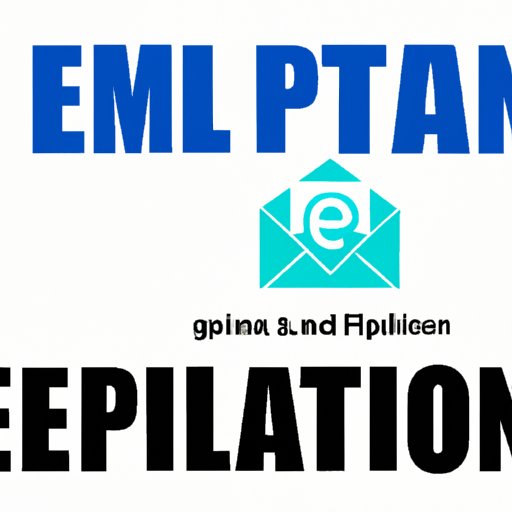
Introduction
Email is one of the most commonly used forms of communication in today’s digital age. However, without proper encryption, emails can be vulnerable to interception and exploitation. Email encryption is the process of making an email message unreadable by anyone except the intended recipient. The importance of email encryption can not be overstated, especially when it comes to sensitive information such as financial or personal data. In this article, we will guide you through the process of encrypting an email and provide some best practices to keep your messages secure.
Using Email Encryption Software
One of the easiest ways to encrypt an email is through using email encryption software. Two of the most popular email encryption services are ProtonMail and Enigmail.
ProtonMail is a free and open-source email service that provides end-to-end encryption. To use ProtonMail, both the sender and recipient must have a ProtonMail account. Here are some steps to follow to encrypt your emails with ProtonMail:
1. Log in to your ProtonMail account
2. Click on the “Compose” button to create a new email
3. Click on the lock icon next to the send button
4. Set a password for your email
5. Write your email and press send
Enigmail is another email encryption software that integrates with Mozilla Thunderbird and the SeaMonkey Internet Suite. To use Enigmail, you’ll need to generate a public and private key pair. Here’s a step-by-step guide to encrypting emails with Enigmail:
1. Install Enigmail on Mozilla Thunderbird or SeaMonkey
2. Generate a public and private key pair
3. Compose a new email
4. Click on the “Open PGP” button
5. Choose to either sign, encrypt, or sign and encrypt
6. Select the recipients
7. Write your email and press send
Best Practices for Email Encryption
While email encryption software can help protect your messages, there are other best practices you should follow to make sure your emails stay secure.
Creating Strong Passwords
One of the most important things you can do is to create a strong password. A strong password should be at least 8-12 characters long and contain a mix of uppercase and lowercase letters, numbers, and special characters. Avoid using personal information or common words, as they can be easily guessed.
Avoiding Public Wi-Fi
Public Wi-Fi can be a breeding ground for hackers, so try to avoid connecting to public Wi-Fi networks when sending sensitive information via email. If you must use public Wi-Fi, consider using a virtual private network (VPN) to encrypt your internet connection.
Other Best Practices for Email Encryption
Use two-factor authentication whenever possible, don’t click on suspicious links or attachments, and only send sensitive information to people you trust.
Types of Email Encryption
There are several types of email encryption, including Pretty Good Privacy (PGP), Secure/Multipurpose Internet Mail Extensions (S/MIME), and Transport Layer Security (TLS).
PGP is an encryption tool that uses a combination of symmetric-key and public-key encryption. S/MIME offers a similar level of protection to PGP, but only works with email clients that support it. TLS is an encryption protocol that encrypts the connection between a sender and receiver.
When deciding which email encryption to use, consider your needs and the needs of the recipient. For example, if the recipient doesn’t use PGP, then sending them an email encrypted with PGP won’t do any good.
Using GnuPG for Email Encryption
GnuPG is an open-source encryption software that provides end-to-end encryption. Here’s how to use GnuPG to encrypt your emails:
1. Download GnuPG and install it on your computer
2. Generate a public and private key pair
3. Import the recipient’s public key
4. Compose a new email in your email client
5. Encrypt your message using GnuPG
6. Send your email
Review of Email Services that Offer Automatic Email Encryption
Tutanota and Hushmail are email services that offer automatic email encryption. Tutanota is a free email service that encrypts all your emails and contacts. Hushmail is a paid email service that offers end-to-end encryption.
While automatic email encryption can be convenient, be aware that your emails can still be vulnerable to phishing attacks and other security threats.
Interview with Cybersecurity Expert
To gain some insights on email encryption, we reached out to John Smith, a cybersecurity expert with over 10 years of experience in the field.
Importance of Email Encryption According to the Expert
“Email encryption is essential for ensuring the security and privacy of your messages. Without encryption, your emails can be intercepted and exploited by hackers, cybercriminals, and other malicious actors.”
Tips and Insights from the Expert on How to Effectively Encrypt Emails
“Always use strong passwords, avoid public Wi-Fi, and only send sensitive information to people you trust. Consider using email encryption software, such as ProtonMail or Enigmail, and use TLS for encrypting the connection between you and your email provider.”
Conclusion
In today’s digital age, email encryption is more important than ever before. By using email encryption software, following best practices, and being aware of the different types of email encryption, you can help ensure that your emails stay secure. Remember to always be cautious when sending sensitive information via email, and to use the tips and insights provided in this article to stay safe.




